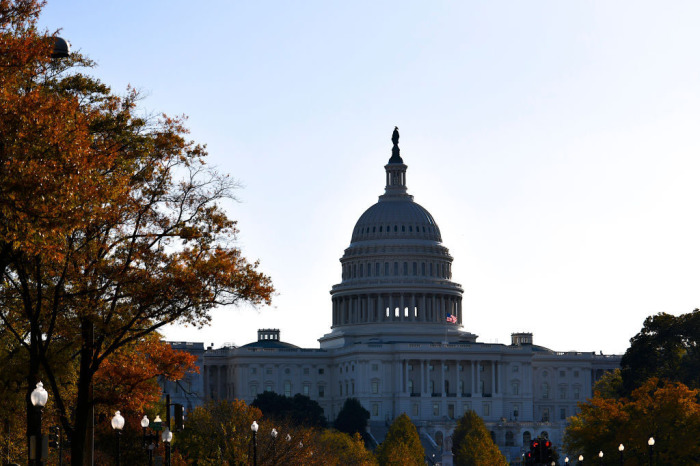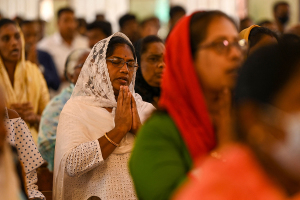Senate compromise to reauthorize USCIRF included in spending bill as deadline looms

The U.S. Senate has agreed on a compromise for the reauthorization of the U.S. Commission on International Religious Freedom as funding for the congressionally mandated watchdog body is set to expire this month if Congress does not act.
The 2020 omnibus package was released by the Senate Appropriations Committee on Monday. Included in the legislation is language to reauthorize USCIRF for three years as it faces expiration at the end of the week.
“Pleased to report that we have reached a bipartisan compromise on our bill to reauthorize the U.S. Commission on International Religious Freedom (USCIRF) & it will pass this week,” Florida Republican Sen. Marco Rubio vowed in a tweet.
USCIRF is a volunteer commission created by the 1998 International Religious Freedom Act to monitor religious freedom violations worldwide and make policy recommendations to the White House, State Department and Congress. USCIRF also advocates for religious prisoners of conscience worldwide.
Objections were raised this year in response to a bipartisan standalone bill that would have provided USCIRF with $4.5 million in funding for the next four years.
Current and past USCIRF commissioners — one of which resigned in November — criticized language in the bill they feared would have changed the scope of USCIRF to also monitor “abuse of religion to justify human rights violations.” The bill would have also created more oversight and rules on commissioner travel and public engagement.
As a result, the legislation was pulled and questions were raised about the future of USCIRF. The commission is funded on a continuing resolution that expires at the end of the week.
"The mandate expansion was the biggest concern," USCIRF Commissioner Tony Perkins, a prominent social conservative activist, told The Christian Post Wednesday.
"We would not only promote and track religious freedom internationally but was a modification of our mission to begin policing religion in many ways. That would dilute our effectiveness and our focus. So, we were glad that it was removed."
Perkins said it took a lot of work and negotiation but the language included in the Senate spending package has "finally gotten to a place where we think it is OK," Perkins said.
"There was a lot of language in there that are in our operating procedures that are really unnecessary for the statute but we do it already," Perkins explained. "In the negotiations, we yielded to that in exchange for taking some stuff out that was more onerous and I think restricted the ability of the commission in terms of its effectiveness."
The language included in the Senate spending legislation includes rules when it comes to USCIRF commissioners’ personal travel and participation in speaking engagements. However, it does not go as far as language included in the USCIRF reauthorization bill pulled earlier this year.
The updated language continues to require USCIRF commissioners — who serve as volunteers — to inform the commission of all speaking engagements in which they are invited to speak in their formal capacity.
The updated language would require all speeches and remarks commissioners plan to make during speaking engagements be made available to other members of the commission in advance of the event.
Language in the previous bill but no longer included in the updated measure would have given USCIRF commissioners the ability to vote on whether other USCIRF commissioners can speak at events they have been invited to speak at in their formal capacity.
"What was problematic in their previously that was taken out was a language that said we had to ensure whoever we were speaking for made clear that they did not mention we were a commissioner," Perkins explained. "If it was mentioned that we were a commissioner, we had to report that annually to Congress, which was just crazy. That was taken out."
The updated legislation would also ban commissioners from accepting travel expenses from non-federal sources. Concern was raised earlier this year after Commissioner Johnnie Moore traveled to Saudi Arabia with other evangelical leaders and visited the crown prince on the eve of 9/11.
Randel Everett, president of the human rights nonprofit 21 Wilberforce, praised the efforts made by the staffs of Sens. Dick Durbin, Bob Menendez, Jim Risch and Rubio for working diligently and collaboratively to resolve differences before the pending deadline for USCIRF’s expiration
“The Commission has played a vital role in raising awareness, helping to free prisoners of conscience, and supporting freedom of religion or belief around the world,” Everett said in a statement.
“As religious freedom advocates, 21Wilberforce understands that the U.S. has a powerful voice and we rely on USCIRF resources and recommendations in our work.”
On Tuesday, the U.S. House of Representatives passed a $1.4 trillion spending package and the Senate is expected to vote in the coming days. In order to keep USCIRF running, reauthorization needs to be signed by President Donald Trump on Friday.
"As far as I know, everybody is on board with the Senate version and that should be what we are looking at," Perkins said of the USCIRF reauthorization language.
White House advisor Kellyanne Conway said Trump is “poised” to sign the spending package if it passes the Senate.
Perkins said a three-year authorization will allow USCIRF to go forward with its mission.
"It is unfortunate that some would play politics with religious freedom," he concluded. "But at the end of the day, Sen. Rubio’s staff did a great job and Sen. [Joe] Manchin’s staff did a great job in moving forward. There is clear bipartisan support for religious freedom both on the commission and in Congress and we are happy to see that and want to see that grow."
Follow Samuel Smith on Twitter: @IamSamSmith
or Facebook: SamuelSmithCP





























